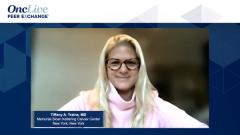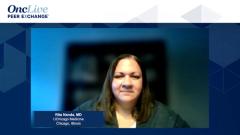
CIN Prophylaxis and Bone Pain
Recommendations regarding how to best manage patients who experience bone pain from chemotherapy-induced neutropenia prophylaxis with growth factor support.
Episodes in this series

Hope S. Rugo, MD, FASCO: Bone pain is an issue. Bill, you talked about that earlier. What do you do to try to prevent bone pain?
William J. Gradishar, MD: We don’t know how to prevent bone pain because I’m not sure we know who’s going to get it. Not everybody gets it. When it does occur, if we can conclude that it’s growth factor induced, then oftentimes we’ll give a course of steroids or antihistamines, which in some cases is helpful to patients. We have to see how a patient is going to respond. I’m not sure we necessarily prophylactically give every patient something because not every patient experiences bone pain.
Hope S. Rugo, MD, FASCO: It seems when you start treatment in patients with naïve bone marrow, you’re more likely to see it, but some people seem to get it all the time. Tiffany, would you do anything differently?
Tiffany A. Traina, MD: No, with agitation in advance, I’d use nonsteroidal anti-inflammatories. There have been some anecdotal data around using antihistamines, thinking about what the mechanism of the bone pain is. I’m not sure how successful that is, but I don’t know how harmful it is either. Those are some of the tricks. Bone pain can be really limiting for our patients for several days in-between doses, days lost because of severe pain.
Hope S. Rugo, MD, FASCO: Yeah, we take the approach of giving everybody nonsedating antihistamines, which we use for all sorts of things—a rash from this or that, bone pain, you name it. It works variably. It doesn’t always work well, but it has little downside being cheap and nontoxic. Additionally, dermatologists told me that they often give these drugs that are only once a day, 3 times a day. So you can actually escalate dosage even for a few days. Bone pain usually occurs fairly quickly. Is that right, Rita? It doesn’t last?
Rita Nanda, MD: Yeah, it usually occurs pretty quickly, so I always forewarn patients, “If you start experiencing pain, start taking some anti-inflammatory medications. If the over-the-counter stuff doesn’t work, reach out, and we can easily prescribe some steroids just to nip it in the bud.” As Tiffany said, there’s a lot of agitation around bone pain so we can capture it early.
Hope S. Rugo, MD, FASCO: It’s always nice to avoid the emergency department visits for chest pain because people think they may be having a heart attack or something.
Transcript edited for clarity.




































